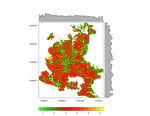Biography
I’m now a PhD student in School for Environment and Sustainability, University of Michigan and an IGCB Graduate Fellow. I’m broadly interested in climate change and forecasting the impact of human activities to global phenology with ecological modeling. As a new PhD student, I’m now intending to enrich my knowledge in ecology and advanced statistical methods. I aim to use numerical models and simulations to analyze the feedbacks of human activities and alleviate the burden on ecosystem. I’m now guided by Dr. Kai Zhu. I graduated from Department of Environmental Science and Technology, Tongji University in 2022 with a Bachelor of Science in Environmental Science.
Download my resumé
- Numerical Simulation
- Ecological and Environmental Problems
- Wildfire
- Information Retrieval
-
SEAS PhD Program, 2022 - present
University of Michigan, Ann Arbor
-
BS in Environmental Science, 2018 - 2022
Tongji University
Experience
Developed a new model to analyze the relationship between water qualities, both influent and effluent, and energy consumption of Wastewater treatment plants.
Skill: Environmental Impact Assessment; water-energy-carbon nexus; Python (Programming Language); MATLAB
Skill: Environmental Monitoring; UV/Vis Spectroscopy; IR Spectroscopy
Recent Posts
Projects
Featured Publications
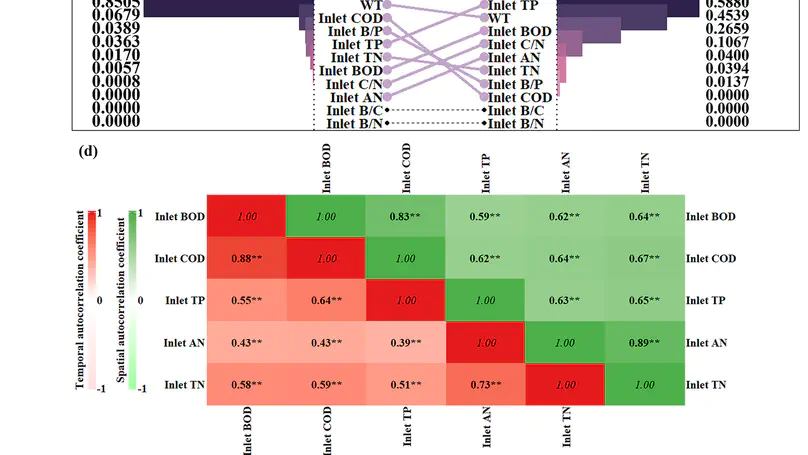
To explore the water-energy-carbon nexus of wastewater treatment (WWT), advanced tools such as machine learning play a crucial role. Current research has primarily constructed energy efficiency models, but there exists a lack in considering comprehensive dimensions and comparing pollutant removal types. In this study, we conducted spatial and temporal modeling to predict the energy consumption (EC) of WWT via machine learning approaches. EC (kWh) was the target feature, with the input features covering operational conditions, environmental benefits, and externalities. The optimal spatial model obtained a test R2 of 0.8224 in ridge regression, while the temporal model achieved a test R2 of 0.7253 in random forest. Besides, the removal amount (103 kg) fit best with EC during the spatial modeling, while the discharge concentration (mg/L) fit best with EC during the temporal modeling. Notably, treatment volume, the removal of chemical oxygen demand, and the removal of ammonia nitrogen emerged as the most significant factors. Given this, our findings suggest optimization implications including scale economy utilization and aeration improvement. The spatial and temporal dimensions also illuminated tailored strategies on influent regulation, technology selection, and effluent standard settings for a specific region and season. Results will provide valuable guidance for existing operation and future design of WWT projects toward energy-saving and carbon neutrality.
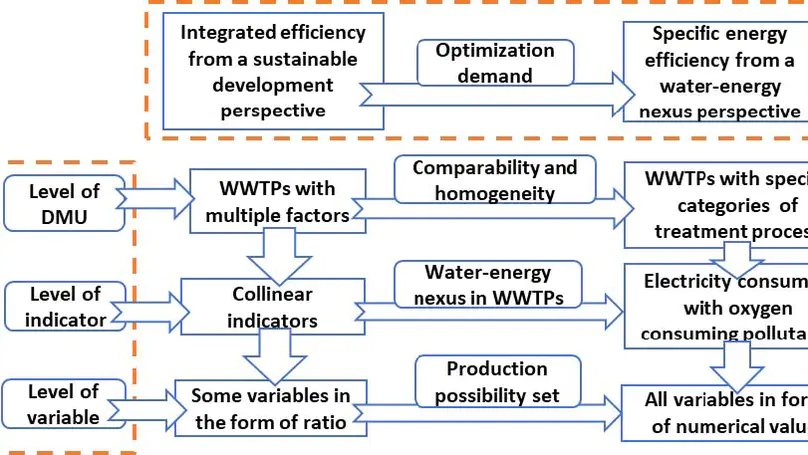
With the urgent demand on the optimization from both aspects of water quality and energy consumption, the efficiency of WWTPs from a water-energy nexus perspective appears to be increasingly important. In this study, the energy efficiency of 210 WWTPs in Yangtze River Delta of China were assessed through data envelopment analysis (DEA). The operational conditions of DEA were polished through a hierarchical framework. All WWTPs were classified into 4 categories of anaerobic-anoxic-oxic (AAO), anaerobic-oxic (AO), oxidation ditch (OD) and sequencing batch reactor (SBR). And the variables derived from the indicators were revised through production possibility set (PPS) in order to remove the ratio form. The results showed that WWTPs in Yangtze River Delta had a high efficiency overall. It also indicated that advanced treatment process didn‘t have a remarkable impact on the efficiency. Moreover, there were much room for the optimization on pollutant removal in terms of the ideal discharge limit converted from the projection.
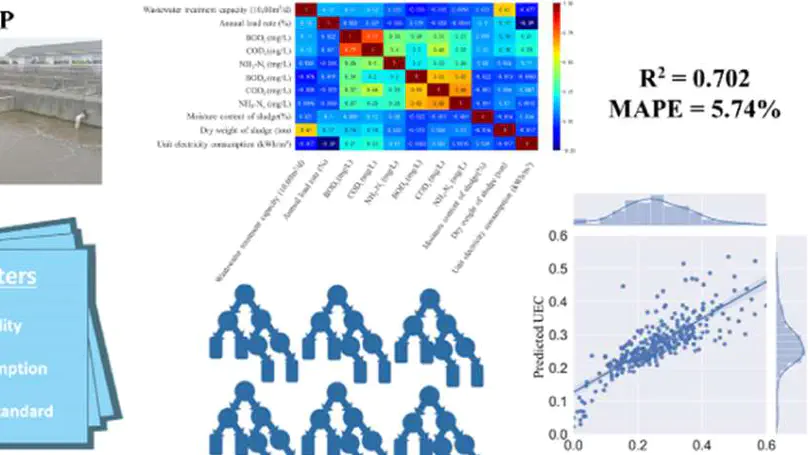
Wastewater treatment plants (WWTPs) can account for up to 1% of a country’s energy consumption. Meanwhile, WWTPs have high energy-saving potential. To achieve this, it is necessary to establish appropriate energy consumption models for WWTPs. Several recent models have been developed using logarithmic, exponential, or linear functions. However, the behavior of WWTPs is non-linear, and difficult to fit with simple functions particularly for non-numerical variables. Thus, traditional modeling methods cannot effectively describe the relationship between water and energy in WWTPs. Therefore, a machine learning method was adopted in this study to investigate the energy consumption in WWTPs; a novel energy consumption model with a non-numerical variable (discharge standard) for WWTPs was developed using the random forest algorithm. The model can also predict the energy consumption of WWTPs after upgrading discharge standards. We found that the unit electricity consumption of WWTPs exhibited an average increase of 17% after the effluent discharge standard was raised from Class I B to Class I A (per China’s classification). The correlation coefficient of the model was 0.702, and the Mean Squared Error was 0.0112 (kWh/m3)2, while the Mean Absolute Percentage Error was 6.86%. Thus, the developed model can provide a better understanding of energy efficiency in WWTPs.
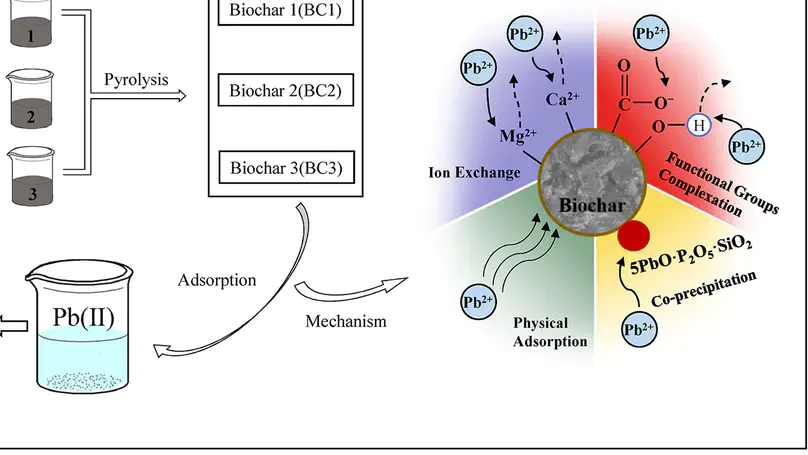
In this study, three types of sludge-derived biochars (BC1, BC2 and BC3) were prepared by 1) original sludge, 2) sludge after K2FeO4 conditioning, and 3) sludge after acidification + K2FeO4 conditioning. The results show that the biochar prepared from the conditioned sludge has additional functional groups, and its Pb2+ removal effect is greatly enhanced. The concentration of Pb2+ in the effluent can be reduced to <0.06 μg/L. The original sludge-derived biochar can only remove at most 58.02% of Pb2+. The maximum adsorption capacity of BC3 is six times greater than that of BC1. The ion exchange effect of Ca2+ and Mg2+ on the biochar surface and the complexation of free -OH or -COOH functional groups lead to an excellent adsorption effect on Pb2+. The sludge-derived biochar prepared after the conditioning of K2FeO4 can realize efficient removal of Pb2+, providing new initiatives for subsequent sludge resource utilization.
Publications
Contact
- zhangsk@umich.edu
- NA
- 440 Church St, Ann Arbor, MI 48109
- Samuel T. Dana Building
-
Office Hours
Register

